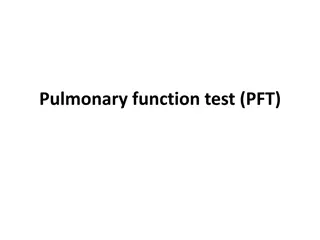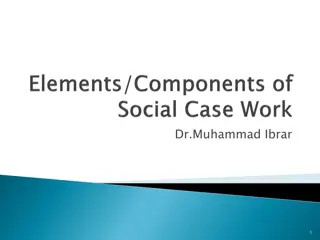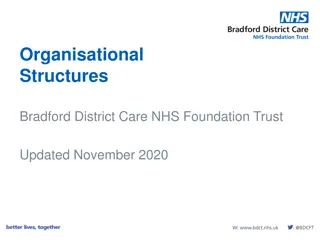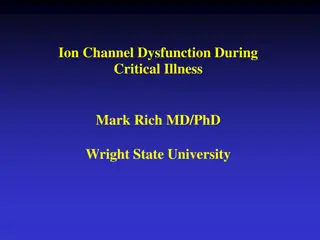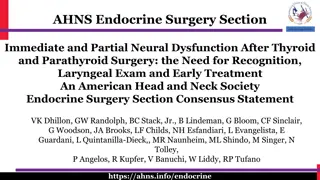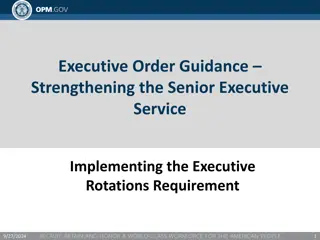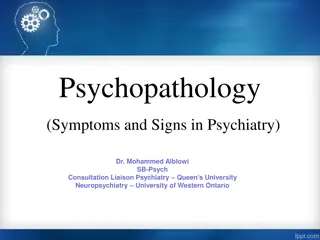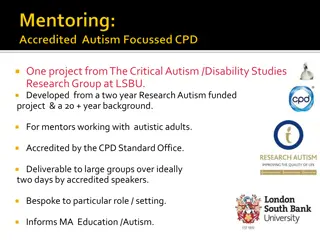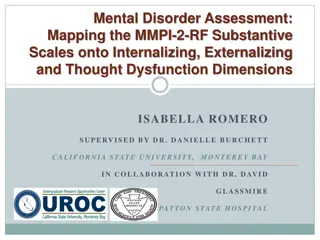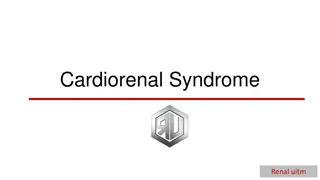Understanding Executive Functioning and Executive Dysfunction
Executive Functioning is a key aspect of cognitive function, encompassing various abilities such as planning, self-awareness, and emotion regulation. Executive Dysfunction, often resulting from frontal lobe injuries, can lead to difficulties in decision-making, social interactions, and learning. This content explores the concept of Executive Functioning, its common effects, and a real-life case study highlighting the challenges faced by individuals with Executive Dysfunction.
Download Presentation

Please find below an Image/Link to download the presentation.
The content on the website is provided AS IS for your information and personal use only. It may not be sold, licensed, or shared on other websites without obtaining consent from the author. Download presentation by click this link. If you encounter any issues during the download, it is possible that the publisher has removed the file from their server.
E N D
Presentation Transcript
Executive Function Myth or Magic Gary Cunningham
The Functional Test Can the person: - 1. Understand the information relevant to the decision 2. Retain the information 3. Use or weigh the information 4. Communicate
What is Executive Functioning? According to Headway, it is an umbrella term that includes: - Planning and organisation Self-awareness Initiating appropriate behaviour Inhibiting inappropriate behaviour Controlling emotions Concentrating and taking in information Motivation
What is Executive Functioning? Executive Dysfunction is: .term for the range of cognitive, emotional and behavioural difficulties which often occur after injury to the frontal lobes of the brain. Headway.org.uk
Some Common Effects of Executive Dysfunction Loss of 'get up and go'. Problems with thinking ahead and carrying out the sequence of steps needed to complete a task. Finding it hard to anticipate consequences Acting too quickly and impulsively without fully thinking through the consequences Reduced ability to engage in social interactions Difficulty with learning new information
SAR Re. KH Gloucestershire SAB 2016 KH, male, moved to Glos in 2010. Had several adult children, some of whom lived with KH Started to have difficulty walking, eventually leading to using a walking frame GP visited concerns about state of home KH would attend hospital as inpatient for investigation but would discharge himself 2015 KH switched off and appeared to have given up
SAR Re. KH Gloucestershire SAB 2016 Visited GP early 2015 leg oedema, skin breakdown on buttocks and incontinence, as well as other issues Various issues around Nurses, visiting but not gaining access; GP appointments made but not attending regular pattern of KH s behaviour SW and OT did manage to visit condition of flat and lack of cleaning
SAR Re. KH Gloucestershire SAB 2016 December 2015 call made to emergency services Ambulance team found KH to have significant pressure sores (Grade 4 with maggots) Flies/insects flying round the room Flat cluttered, full black bin-liner bags blocked the majority of floor space KH survived
SAR Re. Hannah Gloucestershire SAB 2017 Hannah, was 26 in 2016 Described as highly intelligent, articulate, caring and multi-talented She had on-going physical and mental health challenges increasing obesity, self-harming behaviours and illicit drug use Up to January 2015 she had been sectioned under the MHA, had therapeutic interventions, contact with the police and over 100 attendances to hospital over a 12 year period
SAR Re. Hannah Gloucestershire SAB 2017 Hannah was admitted to hospital Feb 2015 initially felt she lacked capacity to make sound (?) decisions. Discharged on 3 March re-admitted on the 6thMarch for 6 days Staff thought that to some extent, Hannah had been through so many things that she felt she was invincible and didn t recognise the increasing risk she was putting herself under.
SAR Re. Hannah Gloucestershire SAB 2017 November 2015 Hannah had taken an overdose, but refused to go to hospital January 2016 broken needle in her arm Discussed potential risks, amputation of arm and death due to health problems and Hannah understood May 2016 Hannah underwent surgery and discharged (10thMay) with community support
SAR Re. Hannah Gloucestershire SAB 2017 May 26th wound necrotic and urged Hannah to seek urgent medical attention. She declined to go to hospital Nurse explained risk of dying and Hannah was taken to a different hospital by a friend May 27th Hannah died
SCR Re. Mr C Bristol SAB 2016 Mr C, aged 61 in 2014, suffered mental health problems since approx. 1985 He had a history of being sectioned under the MHA and was being supported in his BCC rented flat by various health care professionals 2012 Mr C s son advised AWP that he couldn t support his father any longer due to his use of cocaine and increased threat of violence by his father
SCR Re. Mr C Bristol SAB 2016 June 2013 report smoke was coming from Mr C s balcony having a BBQ September 2013 twice fire brigade called to deal with more BBQ s told no more BBQ s due to fire risk March 2014 smoke from the balcony warned again about burning items May 2014 2 further visits by fire brigade
SCR Re. Mr C Bristol SAB 2016 30 May injunction issued prohibiting Mr C lighting fires in his flat. Mr C said he understood why the injunction was needed Early July visit noted charred and burnt furniture . Identified risks in the continued use of candles and fires for cooking he did not see as a fire hazard 6 September A fire broke out in the flat and Mr C died
TB v KB and LH [2019] EWCOP 14 KB, a 75 year old man, divorced in 2010 and has 2 adult children Has long standing issues with alcohol consumption and various medical conditions Through alcohol he urinates in public, inappropriate and anti-social behaviour Physically minor cardiac event several years ago, diagnosed with prostrate cancer, secondary in lungs and bones
TB v KB and LH [2019] EWCOP 14 Hospital notes 2012 KB s cognitive state was fair, although evidence of some short-term memory loss 2016 very significant cognitive problems .marked deficits in short term memory .consistent degree of unawareness of his problem are consistent with a dementing illness
TB v KB and LH [2019] EWCOP 14 the deficits identified in P s (KB) memory and executive function mean that he not be able to retrieve relevant information and not be able to use and weigh . Macdonald J People with executive functioning and deficits in their short-term memory may be okay, but may have difficulty in electing the right bits and using them in context Professor Kapur
Myth or Magic? It s real! However, deficits in Executive Functioning is part of the diagnosis The magic comes from how you use the skills that you have in questioning - Is the person really using the information? Are they really weighing up the information?



